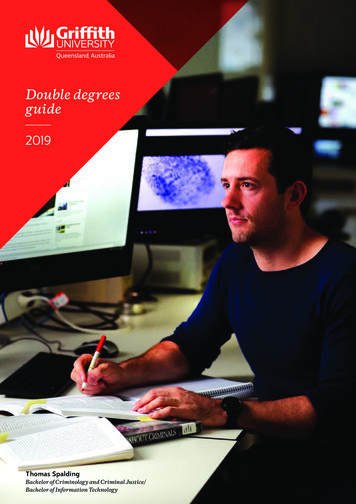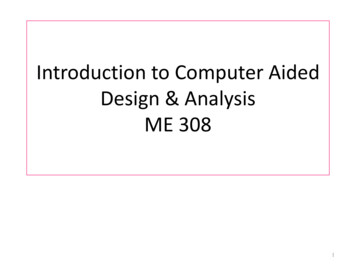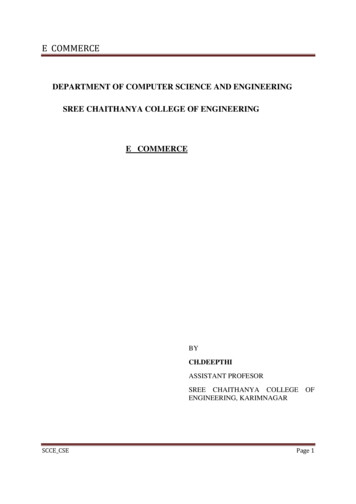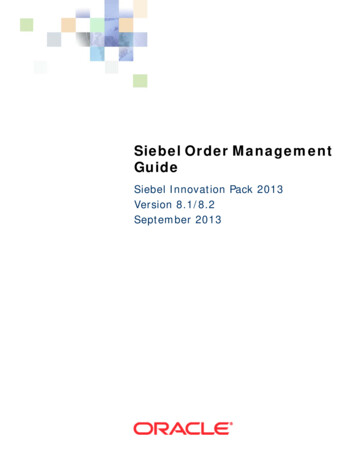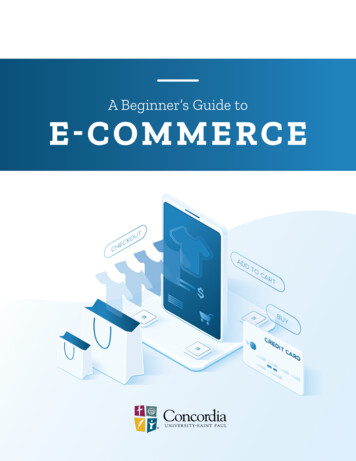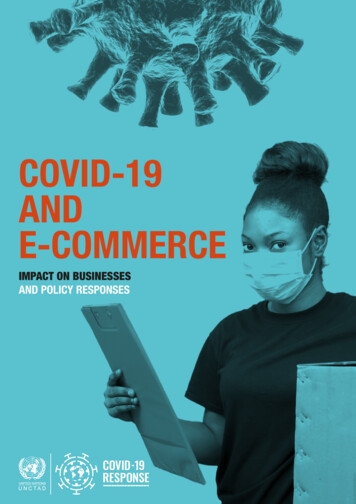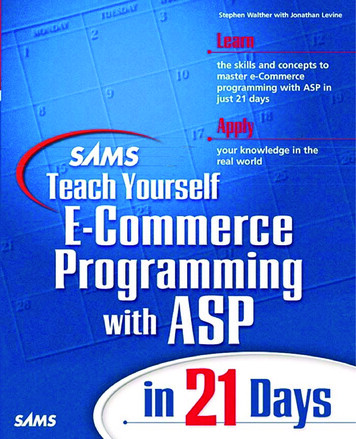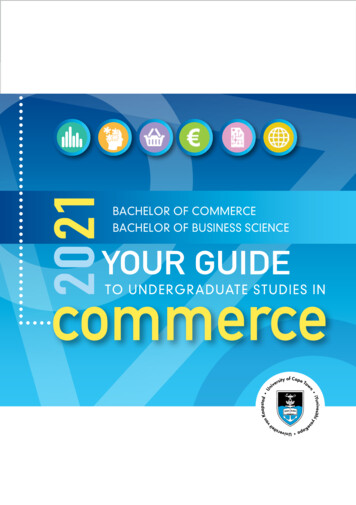
Transcription
BACHELOR OF COMMERCEBACHELOR OF BUSINESS SCIENCE
IMPORTANT TIPS FOR ALL POTENTIALCOMMERCE APPLICANTSYou must take Mathematics at school to apply forundergraduate studies in Commerce. Mathematical Literacy isNOT sufficient.If you are studying Mathematical Literacy you may want toapply to Humanities where Mathematics is not necessarilyrequired for every degree.You do not need to have Accounting, Economics or BusinessStudies as subjects at school to study in Commerce.Write both National Benchmark Tests (NBTs) as early aspossible. To be considered for Commerce, you need to do boththe Academic Literacy and Quantitative Literacy (AQL) andMathematics (MAT) tests.The closing date for applications is 31 July.Late applications will not be considered.If you want to apply for Student Housing, you should do so asearly as possible. Applications are open from April.When you apply to Commerce, you do not need to specify adegree choice. You only need to choose ONE of the options below:ACTUARIAL SCIENCE BBusSc/BComMainstream ORAcademic Development programme*ALL OTHER COMMERCE DEGREES BBusSc/BComMainstream ORAcademic Development programme*(* See pages 12 – 15 for details)For more information, visit the Faculty Downloads page atwww.commerce.uct.ac.za or contact theCommerce Faculty Office (details on page 30).A range of student advisors will be available during orientationand registration to offer further advice and guidance.
CONTENTSTO UNDERGRADUATE STUDIES INWELCOME TO THE FACULTY OF COMMERCE4MAKING A DEGREE CHOICE5WHY CHOOSE COMMERCE AT UCT?6DEGREE PROGRAMMES AT A GLANCE8BCOM OR BBUSSC? HOW DO I CHOOSE?10EDUCATION DEVELOPMENT UNIT12KEY DISCIPLINE AREAS16ADMISSION REQUIREMENTS26CONTACT DETAILS303
WELCOME TO THE FACULTY OF COMMERCEWe are delighted that you are considering theFaculty of Commerce at UCT as the place topursue your studies.TOYou canjoin top studentsWELCOMETHEfrom all over theOFcountry,continent and theFACULTYCOMMERCEworld and become part of a richly diversestudent body striving for academic excellence.You will be learning with and from thebrightest and the best. Importantly, yourworld view will be challenged and expandedthrough your interactions with exceptionalyoung minds both inside and outside theclassroom.You and your classmates will go on to becomeleaders in your chosen fields, and the people you meet at UCT will form part of apowerful network. If you see yourself excelling in the world of business, thenCommerce is an excellent choice. We invite you to explore the various degreeoptions.We hope that this booklet will help you to make the important decision of what tostudy initially. Be assured that an exciting future lies ahead of you with UCT!We look forward to welcoming you to Commerce,Associate Professor Linda Ronnie (Dean of Commerce)IF YOU SEE YOURSELF EXCELLING IN THEWORLD OF BUSINESS, THEN THE FACULTYOF COMMERCE AT UCT IS AN EXCELLENTCHOICE FOR YOU.4
MAKING A DEGREE CHOICECHOOSING A DEGREE IS NOT THE SAME ASCHOOSING A CAREERAlthough some qualifications appear to be directly connectedto specific fields of work (e.g. Chartered Accountant orActuary), in a continuously changing world, Commercedegrees prepare you for a multitude of careers and you will beexposed to several disciplines during your studies.DO SOME RESEARCH BEFORE DECIDINGNobody can fully predict the future or what needs the economyand society may have in 10 years. If you have a specific career inmind, find out as much as you can about it. Several degreesmight lead to your career choice and you should be wellinformed to find the option that best suits your abilities.IF YOU ARE UNSURE OF WHAT TO DO, WE ARE HERETO HELP YOUMany students start their degree being unsure of where itmay lead. If you are unsure, speak to us! We offer careeradvice to assist you. Students who are happy and interestedin their studies are more committed and successful, so ensurethat YOU choose something that makes YOU feel fulfilled.YOU DON’T HAVE TO SETTLE ON A CAREERRIGHT AWAYCareer choice is not a once-off decision taken in Grade 12.Career development is an ongoing process, and most peoplehave a number of different careers during their working life.5
WHY CHOOSE COMMERCE AT UCT?1ACADEMICEXCELLENCEUCT’s excellent reputation isgrounded in solid academictheory and research, combinedwith a high level of businessand professional contact, whichenables us to offer relevant,highly regarded qualifications.3TEACHINGMETHODSWe place great emphasis oninnovative teaching methods,provide small group tutorials,and high levels of consultationwith academic staff.62INNOVATIVERESEARCHAcademic staff contribute toresearch in a variety of fieldsand collaborate widely withother universities both locallyand internationally. Thisresearch is brought into theclassroom to enhancelearning.4PERSONALDEVELOPMENTUCT offers a comprehensivearray of student developmentservices and personalisedcareer planning. Students havea wide range of extracurricularoptions including sporting,social, cultural, environmentaland spiritual activities.
5DEGREEFLEXIBILITYWhile in the early stages ofyour undergraduate studies,you may choose to changespecialisations or degrees.7WHAT’S ONOFFER?The Faculty offers twoundergraduate degrees, aBachelor of Commerce (BCom)and a Bachelor of BusinessScience (BBusSc). Both aredesigned to provide you withmaximum flexibility in yourcareer.6CAREERCHOICESOur undergraduate degreesmeet international standards ofexcellence. Whether you wantto work locally, elsewhere inAfrica or overseas, change jobsor even careers, yourCommerce degree will enableyou to succeed in a rapidlychanging work environment.8ACADEMICDEVELOPMENTCommerce offers both degreesas standard or AcademicDevelopment (AD)programmes. If you meet therequirements for the AD BComor BBusSc programmes, youmay plan to complete yourdegree over the standard or anextended period (dependingon your faculty points score).7
DEGREE PROGRAMMES AT A GLANCEThe Faculty offers two undergraduate degrees: the four-year Bachelor of BusinessScience (BBusSc) and the three-year Bachelor of Commerce (BCom).Please note that for Chartered Accountants, you must complete the PostgraduateDiploma in Accounting regardless of whether you do the BBusSc or the BCom as anundergraduate degree.Even if you don’t do a Commerce undergraduate degree, there are options to studyin Commerce at postgraduate level through our Postgraduate Diplomas inManagement.Bachelor of Business Science Degree (4 or 5 QuantitativeFinance)AnalyticsComputerScienceNote: Science Maths (MAM1000W) is compulsory for the above specialisations andrequires a minimum of 70% in NSC Mathematics.Note: Commerce Maths (MAM1010 and MAM1012) is required for the specialisationsbelow and requires a minimum of 60% in NSC Mathematics.8EconomicsEconomicswith lPsychologyFinancewithAccounting
Bachelor of Commerce Degree (3 or 4 years)ACCOUNTING: tAccountingwith LawACTUARIAL SCIENCE: antitativeFinance)ECONOMICS: SPECIALISATIONSPhilosophy,Politics &Economics(PPE)Economicsand FinanceEconomicsand StatisticsEconomicswith LawINFORMATION SYSTEMS: s andComputerScienceInformationSystems andFinanceMANAGEMENT STUDIESManagementStudies9
BCOM OR BBUSSC – HOW DO I CHOOSE?What are thesimilarities?BCOM OR BBUSSC?HOWDO I CHOOSE?Entry requirements are similar for both degrees. Each degree offers a variety ofspecialisations to cater both for the interests of our students and employmentneeds. Both degrees are highly marketable.The first year of the BBusSc and the BCom is more or less common, for two mainreasons:1All Commerce graduates should have a solid academic foundation in a rangeof ‘core’ subject areas: Accounting, Information Systems, Economics, BusinessLaw, Mathematics, Statistics, Evidence-based Management and Ethics.2We do not expect first-year students to finalise their degree choices beforebeing exposed to the disciplines at a tertiary level. The degrees are similar togive students the flexibility to change as they discover where their strengthsand interests lie.What are the differences?In the standard format, a BBusSc takes four years to complete, and a BCom takesthree years.As the BBusSc takes a year longer to complete, students specialise in a discipline upto 4th year (level 8) enabling them to apply for a related Master’s degree. BComstudents can apply to do a 4th year (level 8) qualification known as Honours or aPostgraduate Diploma after completing their 3-year degree. This enables them toapply to a related Master’s degree after finishing Honours or a Postgraduate Diploma.The BCom and BBusSc degrees may also be taken by South African studentsaffected by disparities in educational or life experiences through the AcademicDevelopment (AD) option offered through the Commerce Education DevelopmentUnit (EDU). The BBusSc can be taken over a four- or five-year period, and the BComover a three- or four-year period. In the EDU, students receive range of additionalsupport. You can find out more about the EDU on pages 12 to 15.10
When do I have to choose?You DON’T select a specialisation when you apply unless it is Actuarial Sciencebecause we want students to make informed choices after they learn more duringOrientation at the beginning of their first year.A student accepted into Commerce may register for ANY Commerce degree orprogramme provided that their final Grade 12 scores and NBTs meet the minimumsubject criteria specified on pages 26 to 29.You may only choose ONE of the following four options when you apply:ACTUARIAL SCIENCE BBusSc/BComMainstream ORAcademic Development programme*ALL OTHER COMMERCE DEGREES BBusSc/BComMainstream ORAcademic Development programme** See the following pages for information about Academic Development programmesActuarial Science: If you do not meet the conditional offer points for Actuarial Science, butyou meet the criteria for the other Commerce degrees, we will automatically make you anoffer for those degrees. If, in your final Matric and NBTs, you meet the minimum ActuarialScience entrance criteria, you will be eligible to register for an Actuarial Science degree.All other Commerce undergraduate programmes: Your final choice of which degree ordiscipline to register for is made ONLY at the end of orientation once you have receivedmore information on the common core of 10 courses in all degrees, the flexibility betweenthe degrees and the different disciplines offered.11
EDUCATION DEVELOPMENTDEVELOPMENT UNITEDUCATIONUNIT(EDU)(EDU)BBusSc 4– or 5–year degreeBCom 3– or 4–year degree(Both options also include Actuarial Science)The EDU recognises and specifically addresses disparities in South African students’educational or life experiences, so that they can more easily succeed – and excel – intheir studies at UCT. EDU students in turn contribute to the rich diversity of theCommerce Faculty which benefits from a creative and dynamic teaching andlearning environment.The BBusSc and BCom degrees have been structured over a four-or five-year periodand three- and four-year period respectively, and provide a range of additionalsupport and value. The EDU aims to enhance their students’ university experienceby helping them develop a comprehensive range of educational and life skills thatwill not only help them achieve success in their studies, but will also be of value intheir future careers.Admission to the EDUYour application for the EDU Academic Development programmes is carefullyscreened to assess whether you will benefit from the extra support and resourcesprovided. This is informed by UCT’s policy on admissions.Your acceptance is weighed against a variety of admission criteria related toacademic potential and background.Once you are accepted for the AD BBusSc or AD BCom you are eligible to completeany of the BBusSc/BCom specialisations (providing that you meet the particularrequirements for the given specialisation).12
Being on an AD programme provides youwith an extensive variety of support,opportunities and incentives:A variety of waysto assert your voice,confidence andidentity.Enhancedreflective socialconsciousnessand engagedcitizenship.Opportunities inleadership andpresentation skills.Various typesof support andmentoringthroughout thedegree.A sense ofcommunity.Smaller classes inthe first year.EDU structureThe EDU offers augmented degrees (same time with extra support), as well asoffering extended degrees (longer time with more support), spreading the courseload over an extra year.It is important to remember that a student who has completed the requirements forthe EDU BBusSc/BCom will be awarded exactly the same degree certificate as astudent who has completed the standard BBusSc/BCom degree.For more information about the EDU, please do not hesitate to contactus (see contact details on page 30 of this booklet).13
EDUCATION DEVELOPMENT UNIT (EDU)DO YOU QUALIFY FOR EDU?If you can answer YES to at least ONE of thesequestions, then you could be eligible to apply to EDU.EDU OFFERS FLEXIBLE STUDY OPTIONSTO BEST SUIT YOUR ACADEMIC NEEDS1Do you want to do your degree in theSHORTEST TIME with extra support?AUGMENTED PROGRAMMESDo you want to do yourBCom degree in 3 years?Do you want to do yourBBusSc degree in 4 years?BBusScBCom3-year AcademicDevelopmentOR4-year AcademicDevelopmentDo you want to Study Actuarial Science?BCom Actuarial Science3-year AcademicDevelopmentBBusSc Actuarial Science4-year AcademicDevelopmentPlease ensure that you select Academic Development (AD)when you apply.14
1. Are you the first generation in your family to go to university?2. Does your mother speak Ndebele, Xhosa, Zulu, Northern Sotho,Sesotho (Southern Sotho), Setswana, Swati, Venda or Tsonga?3. Does your family get a state pension or grant?PLUS Your schooling experience will also be examined as part ofyour eligibility for EDU programmes.2Do you want an EXTRA YEAR to graspconcepts and consolidate your learning?EXTENDED PROGRAMMESDo you want to do yourBCom degree in 4 years?Do you want to do yourBBusSc degree in 5 years?BCom4-year AcademicDevelopmentBBusScOR5-year AcademicDevelopmentDo you want to Study Actuarial Science?BCom Actuarial Science4-year AcademicDevelopmentBBusSc Actuarial Science5-year AcademicDevelopmentPlease ensure that you select Academic Development (AD)when you apply.15
KEY DISCIPLINE AREASThe options available at university can be confusing as there are so many choices.You won’t really know whether you will enjoy something until you try it. Keep anopen mind and find out what your strengths and interests are, and possibly discoverdisciplines that you had never considered before.In the first year, depending on your choice of programme, you may be exposed tothe disciplines outlined in this section. A number of these disciplines are included inthe core courses required for all undergraduate degrees (BBusSc and BCom) asintroductory knowledge is fundamental for a Commerce graduate working in anyorganisation. Items marked with an asterisk * are part of the core for all degrees.ACCOUNTING *Accounting is essential for financial literacy, which is important in any organisationand in life. So, understanding financial information is empowering whether you arean entrepreneur, the owner of a spaza or corner shop, working in the public sector,or leading a multinational. It is the ability to understand the financial impact ofdecisions on a range of stakeholders (investors, employees, government andsociety) that drives our economy and contributes to an equal society. Andaccountants are key because generally, they understand the flow of the money.A person who is; honest and ethical, committed to hard work, responsive to change,a problem solver, an effective communicator, detail focussed and a lifelong learnerwill make a good accountant.School accounting emphasises the recording of transactions. At university accountingstudies focus on the decision making that influences those transactions,communicating financial information to a wider audience outside the organisation,and interrogating that financial information to ensure that it is reliable.All organisations employ professional accountants (and particularly those who wishto function well). Accountants can work in different areas, including financialreporting, tax, management accounting and decision making, auditing and16
corporate governance, or in the broader economy. Many people who qualify asprofessional accountants later choose careers in senior management.ACTUARIAL SCIENCEActuaries use statistical techniques to solve financial and business problems. Theyevaluate uncertain future events and various other financial risks. Being able toquantify uncertainty and risk helps individuals and companies concentrate onproactively managing their risk and ensuring that they can withstand future adverseevents. Actuaries operate within a strict professional and ethical framework. It isimportant to note that actuaries cannot predict the future, but by using statisticaltechniques given past events and the current environment, they can help to optimisedecision-making for future uncertain events.Actuaries have an extensive skill set used in insurance, pensions, investments,banking, health care, risk management and other areas. Many actuaries use theirtraining to branch into varied business fields, such as agriculture, infrastructure andtelecommunications.As an actuary, you will participate in high-level business decision-making and solvereal-world problems in the industry. You could use your talents to make a meaningfuland positive impact on people’s financial well-being. Actuaries generally have goodstarting salaries and enjoy excellent job security.Actuarial Science is suited to anyone who is willing to undertake several years ofexacting study and has a well-disciplined approach to problem-solving. As theprofessional qualification is so demanding, the University generally requires anapplicant to have obtained at least 80% for Mathematics (higher grade for NSC) andat least 60% for English home language (or 80% for English first additional language)in addition to the required faculty points score.Students who graduate within this specialisation are particularly well prepared forfurther study to obtain the prestigious FASSA (Fellow of the Actuarial Society ofSouth Africa) qualification. UCT is accredited by the Actuarial Society of South Africa(ASSA), and as such, students can gain exemptions from some of the professionalexaminations required for the FASSA designation. Students who meet the demandingstandard can currently obtain exemptions up to 9 of the 12 main professionalexaminations during their undergraduate degree. A further 2 can be gained as partof a postgraduate qualification. Students interested in performing research invarious actuarial fierlds may apply for a Master’s programme after the successful17
completion of their fourth year or Honours studies. Limited places are available, andselection is based on academic merit.The ASSA website (www.actuarialsociety.org.za) provides comprehensive informationfor aspiring actuaries, as well as detailed information on the actuarial curriculumwhich includes the professional exams, modules and workshops needed to qualifyfor the various levels of association with the society.QUANTITATIVE FINANCEThe increasing complexity of the modern financial services environment created ademand for professionals with strong quantitative skills. The Quantitative Financespecialisation, therefore, shares much of the same foundation as Actuarial Science,with a greater emphasis on applications in the world of finance and investment. Asa result, it places equally rigorous demands on students and has the sameentrance requirements.Quantitative finance provides an ideal platform for a career in such fields asinvestment banking, derivatives trading and quantitative asset management. Mostgraduates go on to pursue postgraduate studies in financial economics, mathematicalfinance or the internationally recognised Chartered Financial Analyst (CFA)qualification.ECONOMICS *Economics focuses on the ways in which consumers, firms, and markets operate andthereby teaches students how to analyse critically the factors that affect economicand social development both locally and internationally. Furthermore, it equipsstudents with a useful set of skills to analyse data for informed decision making,which helps foster economic and social development.Economics empowers students to understand the complex relationships betweenindividuals and between institutions in our society. Economics is a continuallyevolving body of theory and empirical research that has been referred to as thequeen of the social sciences and is the only social science that is recognised by theNobel prize committee. It is a remarkably broad discipline that seeks to understandand predict choice behaviour in response to incentives and the welfare consequencesof these choices.18
Anyone interested in the way the world works (e.g., why is poverty so hard toeradicate, what is the role of the Reserve Bank, how should the Finance Ministerallocate the budget, why consumers purchase the goods that they do, why firmsmake the decisions that they do, why markets operate in more or less efficient ways,etc.) will find economics fascinating. Someone with a critical mind and an ability tounderstand logic, mathematics, and statistics will excel in economics.While economics is taught at school, it is at a very simple level and without exploringalternative explanations for fundamental economic phenomena. At university, weassume students have no prior knowledge of economics and teach from firstprinciples. Students are shown how the skills they learn in mathematics and statisticsare applied to economic problems.Professional economists have career possibilities both in the public and privatesectors. Public sector roles include diverse options such as central banking andnational accounting, the design and implementation of economic and developmentpolicy, and work as trade diplomats. In the private sector, they include financialanalysis and asset management, journalism, research for NGOs, consulting firms,business associations and trade unions, as well as independent consulting work.FINANCEMoney is the lifeblood of all organisations and economies. Because the availabilityof money is limited, it is important that funds be raised in the most economical andeffective way and be invested as effectively and profitably as possible whilstminimising the risk involved. This applies to households, communities, businesses,investment funds, and governments. Finance is the discipline that is concernedwith the sourcing, allocation and investment of funds. Thus, good financial skillsand professionals are fundamental to the growth and success of any organisationand country.Finance is both a science (it is based on rigorous theory and quantitative models),and an art (it requires judgment and insights into things like human behaviour). Thus,it is an extremely diverse discipline, which overlaps with accounting, economics,mathematics, politics, psychology, strategy, statistics and many other disciplines.Furthermore, although finance considers the past, it is mostly focused on the future.People who succeed in finance like to deal with diverse information and thecomplexities of the real world.19
One of the challenges that first year students have when choosing a degree is thatthey are often not familiar with the finance discipline. However, some financeelements are covered at school in economics, accounting and business-relatedsubjects.Finance has a role to play in most organisations, but specialists in the field arespecifically employed in the investment industry (asset management), the financialindustry (for example in banks), and in large organisations.INFORMATION SYSTEMS *Information systems are systems based on computers and IT infrastructure that assistus in our daily lives. Every time money is drawn from an ATM; an information systemensures that the transaction is recorded. Information systems are around us throughout organisations and society. People interact with them daily; when usingmobile phone apps, posting messages on social media, booking a flight ticketonline, or even ordering an Uber. Organisations use information systems to deliverbetter customer service, improve business processes and make better decisionsthrough sophisticated analysis and visualisation of data. Information Systemsprofessionals play an essential role by optimising new and existing informationtechnologies to design and develop innovative solutions for the benefit oforganisations and society.Information Systems is an exciting field in which you design, create and implementIT solutions to help organisations to operate better. People working in this area needan interest in and understanding of both business and information technology,effective communication and teamwork skills, and a flair for design and creativity.At school, you may have been exposed to computer-based subjects such asInformation Technology (IT) and Computer Applications Technology (CAT). Bothsubjects differ from Information Systems, which focuses on designing andimplementing computer applications, while CAT and IT focus on using computerapplications.Information Systems graduates are in high demand. All organisations (big and small,business and community) and all sectors (public, private, non-profit) employinformation systems graduates. Medical insurance companies, banks, accountingfirms and government departments depend on information systems. With their skillsin understanding people, computers and organisations, Information Systems20
graduates able to design and implement new solutions that further the developmentof our society.COMPUTER SCIENCEComputer Science is about the creation of computer software, which is requiredfor economic, social and for human development in every country. Many countrieshave economies that either hinge strongly on or were raised out of low-incomestatus because of computing.The 4th Industrial Revolution arose out of the radical changes brought about insociety because of computers. No other discipline has had such a profoundinfluence on modern society. Many of the wealthiest people in the world madetheir fortunes in computing, and numerous economically successful organisationsare computing companies.The most sought-after jobs in the world are in the computing industry. The abilityto design and develop software, to understand the concepts of artificialintelligence, to mathematically solve some of our greatest software challenges, is,without doubt, the most marketable skill on the planet.Successful computer scientists are logical thinkers, disciplined, have an eye fordetail, can communicate in written and verbal form and collaborate well withothers.The high school IT subject concentrates on the mechanics of basic programming,without a solid foundation in fundamental principles and with more emphasis onproblem-solving than design. The degree of Computer Science has little incommon with IT at school. The first year of Computer Science introduces you toprogramming and problem solving, as well as foundational principles of ComputerScience. After that, you move on to higher-level concepts such as operatingsystems, computer networks and concurrent programming.The computer science field requires a high number of qualified graduates everyyear but also needs graduates with different skills to fulfil a variety of roles inindustry, across all sectors. According to industry data, a considerable numberneed to have a combination of computer science and business skills. Both theBBusSc in Computer Science and the BCom in Information Systems and ComputerScience fulfil this requirement.21
LAW *There are many reasons why people choose Law. These include being able to earna good, secure living – because at some point, everybody needs a lawyer; security– as a traditional profession with good income potential; using law to ensure accessto justice amongst marginalised communities; having the knowledge and skills tomake a real impact in specialised areas of commerce (for example shipping, tax andcontracts), contributing to the quality and security of people’s lives by ensuring theyhave their personal legal documentation in order; and contributing to and furtheringacademic knowledge about how the law is developed, practised, implemented andaccessed.Good lawyers are skilled in critical analysis, writing (being able to draft a clear writtenargument), research, argument and presentation, and sharing ideas.Lawyers are employed as advocates, attorneys in law firms, by the Department ofJustice as state attorneys, prosecutors, legal drafters, magistrates and judges and byother government departments. Additionally, law graduates are found across thewhole spectrum of business. There are legal advisers in tax, real estate, labourrelations, contracts, public information and acquisitions; there are forensic auditorsand ombudsmen, ethics and employment officers, policy and legislative analysts.Publishing firms employ legal editors, researchers and writers. And many lawgraduates work for NGOs and Public Interest Organisations.Students who want to qualify to practise as an attorney or advocate in South Africamay complete any bachelor’s degree followed by the three-year postgraduate LLB(Bachelor of Law) degree. The entrance requirement for the three-year postgraduateLLB is a bachelor’s degree with certain pass levels in this first qualification.With some undergraduate degrees, including the BCom and BBusSc Law options, itis possible to complete the postgraduate LLB degree in two years rather than thre
requires a minimum of 70% in NSC Mathematics. Note: Commerce Maths (MAM1010 and MAM1012) is required for the specialisations below and requires a minimum of 60% in NSC Mathematics. Bachelor of Business Science Degree (4 or 5 years) 8 DEGREE PROGRAMMES AT A GLANCE The Faculty offers two undergraduate degrees: the four-year Bachelor of Business
